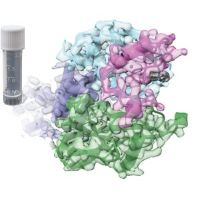Specification
| Description | Recombinant protein from the full-length sequence of Homo sapiens spastin (SPAST), transcript variant 2 (NM_199436). |
| Organism | Homo sapiens (Human) |
| Expression Host | Human Cells |
| Tag Info | His or DYKDDDDK. Please contact us if you need further information or require specific designed tag. |
| Purity | Greater than 90% by SDS-PAGE gel |
| Uniprot ID | Q9UBP0 |
| Entry Name | SPAST_HUMAN |
| Gene Names | SPAST ADPSP FSP2 KIAA1083 SPG4 |
| Alternative Gene Names | ADPSP FSP2 KIAA1083 SPG4 |
| Alternative Protein Names | Spastin (EC 5.6.1.1) (Spastic paraplegia 4 protein) |
| Application | Antigens, Western, ELISA and other in vitro binding or in vivo functional assays, and protein-protein interaction studies; For research & development use only! |
| Buffer | Purified protein formulated in a sterile solution of PBS buffer, pH7.2, without any preservatives |
| Endotoxin | Endotoxin level is < 0.1 ng/µg of protein (<1EU /µg) |
| Length | 616 |
| Molecular Weight(Da) | 67197 |
| Protein Sequence | (The sequence of expressed protein may have some variation from the sequence shown below. Please contact us for the exact sequence.) MNSPGGRGKKKGSGGASNPVPPRPPPPCLAPAPPAAGPAPPPESPHKRNLYYFSYPLFVGFALLRLVAFHLGLLFVWLCQRFSRALMAAKRSSGAAPAPASASAPAPVPGGEAERVRVFHKQAFEYISIALRIDEDEKAGQKEQAVEWYKKGIEELEKGIAVIVTGQGEQCERARRLQAKMMTNLVMAKDRLQLLEKMQPVLPFSKSQTDVYNDSTNLACRNGHLQSESGAVPKRKDPLTHTSNSLPRSKTVMKTGSAGLSGHHRAPSYSGLSMVSGVKQGSGPAPTTHKGTPKTNRTNKPSTPTTATRKKKDLKNFRNVDSNLANLIMNEIVDNGTAVKFDDIAGQDLAKQALQEIVILPSLRPELFTGLRAPARGLLLFGPPGNGKTMLAKAVAAESNATFFNISAASLTSKYVGEGEKLVRALFAVARELQPSIIFIDEVDSLLCERREGEHDASRRLKTEFLIEFDGVQSAGDDRVLVMGATNRPQELDEAVLRRFIKRVYVSLPNEETRLLLLKNLLCKQGSPLTQKELAQLARMTDGYSGSDLTALAKDAALGPIRELKPEQVKNMSASEMRNIRLSDFTESLKKIKRSVSPQTLEAYIRWNKDFGDTTV |
Background
| Function | FUNCTION: ATP-dependent microtubule severing protein that specifically recognizes and cuts microtubules that are polyglutamylated (PubMed:11809724, PubMed:15716377, PubMed:16219033, PubMed:17389232, PubMed:20530212, PubMed:22637577, PubMed:26875866). Preferentially recognizes and acts on microtubules decorated with short polyglutamate tails: severing activity increases as the number of glutamates per tubulin rises from one to eight, but decreases beyond this glutamylation threshold (PubMed:26875866). Severing activity is not dependent on tubulin acetylation or detyrosination (PubMed:26875866). Microtubule severing promotes reorganization of cellular microtubule arrays and the release of microtubules from the centrosome following nucleation. It is critical for the biogenesis and maintenance of complex microtubule arrays in axons, spindles and cilia. SPAST is involved in abscission step of cytokinesis and nuclear envelope reassembly during anaphase in cooperation with the ESCRT-III complex (PubMed:19000169, PubMed:21310966, PubMed:26040712). Recruited at the midbody, probably by IST1, and participates in membrane fission during abscission together with the ESCRT-III complex (PubMed:21310966). Recruited to the nuclear membrane by IST1 and mediates microtubule severing, promoting nuclear envelope sealing and mitotic spindle disassembly during late anaphase (PubMed:26040712). Required for membrane traffic from the endoplasmic reticulum (ER) to the Golgi and endosome recycling (PubMed:23897888). Recruited by IST1 to endosomes and regulates early endosomal tubulation and recycling by mediating microtubule severing (PubMed:23897888). Probably plays a role in axon growth and the formation of axonal branches (PubMed:15716377). {ECO:0000255|HAMAP-Rule:MF_03021, ECO:0000269|PubMed:11809724, ECO:0000269|PubMed:15716377, ECO:0000269|PubMed:16219033, ECO:0000269|PubMed:17389232, ECO:0000269|PubMed:19000169, ECO:0000269|PubMed:20530212, ECO:0000269|PubMed:21310966, ECO:0000269|PubMed:22637577, ECO:0000269|PubMed:23897888, ECO:0000269|PubMed:26040712, ECO:0000269|PubMed:26875866}.; FUNCTION: [Isoform 1]: Involved in lipid metabolism by regulating the size and distribution of lipid droplets. {ECO:0000269|PubMed:25875445}. |
| Pathway | |
| Protein Families | AAA ATPase family, Spastin subfamily |
| Tissue Specificity | Expressed in brain, heart, kidney, liver, lung, pancreas, placenta and skeletal muscle. The short isoforms may predominate in brain and spinal cord. {ECO:0000269|PubMed:10610178}. |
QC Data
| Note | Please contact us for QC Data |
| Product Image (Reference Only) |  |

